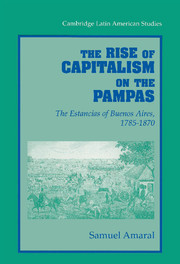Book contents
- Frontmatter
- Contents
- List of maps, figures, and tables
- Weights and measures
- Preface
- THE RISE OF CAPITALISM ON THE PAMPAS
- 1 Introduction
- PART I ESTANCIAS
- PART II CONDITIONS OF PRODUCTION
- PART III HUMAN ACTION
- PART IV RESULTS
- 10 Profit
- 11 Prices and marketing
- 12 Markets
- 13 Conclusion
- Appendix A Profit rates and present value
- Appendix B Probate inventories
- Appendix C Prices, exchange rates, and trade statistics
- Glossary
- Bibliography
- Index
13 - Conclusion
Published online by Cambridge University Press: 30 March 2010
- Frontmatter
- Contents
- List of maps, figures, and tables
- Weights and measures
- Preface
- THE RISE OF CAPITALISM ON THE PAMPAS
- 1 Introduction
- PART I ESTANCIAS
- PART II CONDITIONS OF PRODUCTION
- PART III HUMAN ACTION
- PART IV RESULTS
- 10 Profit
- 11 Prices and marketing
- 12 Markets
- 13 Conclusion
- Appendix A Profit rates and present value
- Appendix B Probate inventories
- Appendix C Prices, exchange rates, and trade statistics
- Glossary
- Bibliography
- Index
Summary
The estancia was a type of economic organization that led the process of economic expansion in nineteenth-century Buenos Aires. Estancias had existed since the early days of Spanish settlement in the region, but it was only in the late eighteenth century and during the nineteenth century that they turned into a dynamic type of organization. This change was partially due to external factors – a growing European demand for hides – affecting the local structure of relative prices. But it was also due to human endeavor aimed at the search for profit. The number of cattleowners and head of cattle at the beginning of that process made it impossible for any of the former to attempt the exclusion of actual and potential competitors by means of regulation for privilege. Moreover, an increasingly ineffectual authority, due both to the weakness of the Spanish crown and the new challenges posed by the opening up of new land, turned any such attempt into an unthinkable proposition. So when estancias started to spread over the pampas and their main product turned out to be hides for export, estancieros had to compete with each other and to organize factors of production in a way leading to the survival of the firm. Demand was steady, but there were no guarantees of profit. Individual estancieros had to cope with political insecurity, the Indian threat, the weather, price fluctuations, and many other factors generating uncertainty. It was only their ability to do so that could lead to making a profit out of estancia operations. Estancia operations were therefore guided by market signs.
- Type
- Chapter
- Information
- The Rise of Capitalism on the PampasThe Estancias of Buenos Aires, 1785–1870, pp. 285 - 290Publisher: Cambridge University PressPrint publication year: 1998



